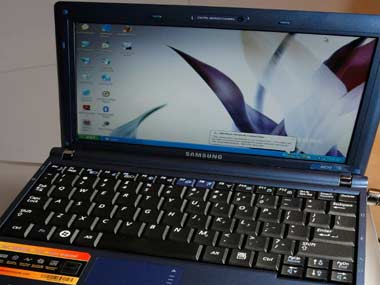We wanted to love them. Netbooks were cute, so small, pocketable or purseable, and yet they looked and behaved almost like full-blown notebook computers. They also boasted phenomenal battery life, often up to 10 hours, and yet the early netbooks were much cheaper than their bigger, more powerful cousins. However, the relationship soured quickly, and now it looks like netbooks might be on the way out.
The latest downbeat speculation about netbooks’ future comes from a rumour based on a leaked email that Samsung might be winding down its netbook line. The email specifically targeted 10.1 inch netbooks for the axe as the company shifts focus to ultrabooks, a new range of svelte but powerful notebooks. Ultrabooks are aimed to compete with Apple’s Air notebook line.
[caption id=“attachment_142636” align=“alignleft” width=“380” caption=“Netbooks remain competitive only in the ultra-cheap, low-end of the market, and manufacturers like Samsung don’t make much money on each one they sell. Getty Images”]  [/caption]
How reliable is the rumour? The email was picked up by a French blog and then spread like wildfire to a range of tech sites.
Regardless of the rumour’s provenance, the move makes sense. Netbooks remain competitive only in the ultra-cheap, low-end of the market, and manufacturers like Samsung don’t make much money on each one they sell.
Compare that with ultrabooks: Super slim, powerful laptops that have the portability and power-saving features of a netbook without the performance sacrifices. Ultrabooks aren’t pitched at bargain hunters but at business professionals and executives who have money to spend and want something ultra-portable. Samsung and other computer makers are looking to get out of the low-end of the market to focus on higher margin lines of their business.
Why netbooks failed
It’s clear that netbooks are struggling. Acer’s recently soft results have been attributed to their misplaced focus on netbooks. In Western Europe, netbook sales collapsed by 40% in the third quarter of 2011, according to research firm Gartner.
What happened to netbooks? First off, they never lived up to their promise. The 7-inch netbooks came with small, cramped keyboards that many people found difficult to use and impossible to touch type on.
The early Intel Atom processors that powered most netbooks came only with one core, just as multi-core laptops became the norm. It meant that netbooks were painfully slow on all but the most basic tasks. These shortcomings immediately gave netbooks a bad reputation.
To make up for the lack of power, many manufacturers installed versions of Linux with their own simplified skins. Most consumers, familiar with Microsoft’s Windows, were baffled, and the return rate soared for these devices. In 2008, MSI said that return rates for its Linux-powered netbooks was four to five times higher than that with Windows XP. The return rate issue was even confirmed by open-source OS company Canonical, distributors of Ubuntu.
As Atom processors went dual-core, a major selling point, price, evaporated. It’s now easy to find full-featured although not nearly as portable laptops at about the same price as the tiny netbooks.
Another nail in the netbook coffin came with the release of tablets. When it came to buying a second, portable device, tablets have been beating netbooks hands down. Some tablets, such as the Asus Transformer or even super smartphones like Motorola’s Atrix, have the ability to dock with keyboards to become notebooks. The keyboard dock for the new five-core Transformer sports its own supplemental, and Asus claims that you can get an unheard of 18 hours of use.
The final nail in the coffin is really Intel’s. When the Atom processor came out, it promised much longer battery life than a traditional laptop. Up to 10 hours of use was a real selling point for road warriors, but with Intel’s Sandy Bridge processors now boast real power while also being very, very energy efficient. New laptops often deliver six to 10 hours of use with fewer compromises than netbooks required. In terms of performance per watt, Intel’s i3 processors score better than its Atom line.
Do netbooks have a future? Maybe, but it will mostly be at the under-powered, cheaply produced segment of the market. However, even in price-sensitive markets like Vietnam, netbooks are getting passed over.
The bigger question is not about netbooks but about Intel’s Atom. It launched the processor to challenge power-sipping chips from rival ARM. However, if anything since the 2009 launch of Atom, ARM has solidified its grip on the low power market and now looks set to challenge Intel with its multi-core offerings in tablets and laptops. As we’ve often said here on Firstpost Tech, the battle now is not only about how powerful a chip is but also how energy efficient it is.
This is all good news for the Indian market. More efficient chips not only run longer on a single laptop charge but also run cooler so will be less prone to failing due to Indian heat.
Do you have a netbook? Did it live up to your expectations or leave you disappointed? Did you replace it with something else?


)
)
)
)
)
)
)
)
)



